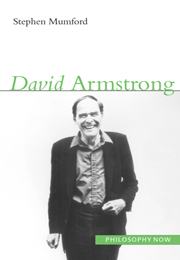1 - Naturalism
Summary
A philosopher who gives a systematic account of the whole world will usually have some fundamental commitment that drives and unites its various elements. David Armstrong is one who does offer a grand vision of the world. His work shows how that vision accounts systematically for philosophically difficult phenomena such as properties, laws, truth, the mind and knowledge. These are some of the key problems that philosophy should aim to solve.
Three general commitments drive Armstrong's philosophy. He is a naturalist, a physicalist, and he thinks that the world is a world of states of affairs. This last view should be called factualism. These commitments form the background against which his sizeable body of work can be set. In various places, he offers philosophical accounts of perception, universals, laws of nature and causation, modality and truthmaking. These can all be understood as naturalistic theories where some problematic area of philosophy is explained in terms of states of affairs, all of which are physical states of affairs. Our first aim is to understand these three commitments better.
In one place he gives explicit endorsement of three theses (N&R: 126):
The world contains nothing but particulars having properties and being related to each other
The world is nothing but a single spatiotemporal system
The world is completely described in terms of a (completed) physics.
- Type
- Chapter
- Information
- David Armstrong , pp. 1 - 18Publisher: Acumen PublishingPrint publication year: 2007



